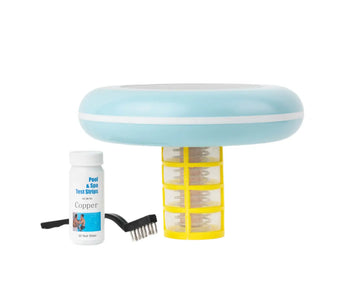
A swimming pool is an excellent way to cool off and enjoy some exercise during the hot summer months. Besides being a fun and refreshing activity, swimming can also provide a solid cardio workout. However, pool maintenance can be a challenge—especially if you're trying to keep it clean without relying on harsh chemicals.
Traditional pool treatments, such as chlorine, often have negative effects on both people and animals. They can irritate eyes, affect respiratory health, and even cause damage to the lungs of young children.
Luckily, there’s an eco-friendly solution: solar pool ionizers. These innovative devices help maintain pool cleanliness by using natural ions to reduce bacteria, algae, and other contaminants. What’s even better is that solar pool ionizers don’t rely on harmful chemicals, making them a safer alternative for your family and the environment.
Before purchasing one, however, it's essential to understand the factors that can influence your decision. Here's a more comprehensive guide to help you make an informed choice:

1. Brand
When choosing any product, the brand can play a significant role in the overall quality and performance. Solar pool ionizers are no exception. While some consumers might overlook branding, it’s important to consider companies with a solid reputation for producing solar-powered products.
Brands that specialize in solar-powered devices or pool maintenance equipment tend to offer better reliability and advanced technology. Look for trusted brands with positive reviews and a history of producing long-lasting, effective ionizers.
Additionally, customer support is crucial when it comes to troubleshooting or replacing parts, so ensure the brand you choose has excellent after-sales service.
2. Pool Size and Coverage
The size of your pool is a key factor in determining the right solar pool ionizer. Larger pools require ionizers with more power or multiple units to ensure effective coverage. For example, pools over 20,000 gallons may need ionizers with larger or additional copper and silver anodes.
Be sure to check the manufacturer’s recommendations regarding the size of the pool the ionizer is suitable for. Many ionizer models specify the maximum volume they can handle, which will help you gauge how many devices you'll need or whether you'll need to upgrade to a more powerful system.
3. Ionizing Elements (Copper & Silver)
Solar pool ionizers rely on anodes made of copper and silver to release ions that kill bacteria, algae, and other harmful organisms. Copper is particularly effective at controlling algae growth, while silver helps prevent bacterial growth.
While copper anodes are typically more effective, they tend to be more expensive than silver anodes. If you’re looking for the most cost-effective option, you can opt for an ionizer with at least 90% copper, which offers a good balance between price and performance. Pure copper anodes, although more expensive, will deliver the best results for both algae and bacteria control.

4. Ease of Installation
One of the main benefits of a solar pool ionizer is that it doesn’t require complex installations. Unlike traditional ionizers that need to be wired into an electrical system, solar-powered models typically float on the surface of the pool and require no external power source.
This makes installation much easier and more cost-effective. Most solar ionizers come with user-friendly setups and do not require professional help to get started.
However, if you're unsure which model is the best for your pool, look for one with simple instructions and minimal setup requirements.
5. The Importance of Oxidizer
While the ions produced by solar pool ionizers help reduce the growth of algae and bacteria, they do not entirely replace the need for an oxidizer.
An oxidizer is a chemical that helps break down organic matter, such as oils, sweat, and leaves, that may still be present in the water. Without an oxidizer, your pool may become cloudy or have a lingering "dirty" appearance despite the use of the ionizer.
Common oxidizers include non-chlorine shock treatments or potassium peroxymonopersulfate, which are less harsh than chlorine and safe for use in conjunction with ionizers. Regularly using an oxidizer can help maintain clear, clean pool water and keep harmful bacteria at bay.
6. pH Stabilization
Maintaining the proper pH balance in your pool is essential for optimal water quality. Solar pool ionizers can assist in stabilizing the pH by gently lowering the water's alkalinity, which can help keep your pool's pH level within the recommended range (7.2 to 7.6). Without proper pH stabilization, you may encounter problems such as skin irritation, cloudy water, or scaling on pool surfaces.
Although ionizers aid in balancing pH, they may not be sufficient on their own. It’s still a good idea to regularly monitor and adjust your pool’s pH levels with pH stabilizers or other pool care products as necessary.

7. Conclusion
Solar pool ionizers offer a chemical-free and eco-friendly way to maintain clean and clear water in your pool. By understanding key factors such as brand reputation, pool size, ionizing elements, ease of installation, the need for an oxidizer, and pH stabilization, you’ll be able to choose the right solar ionizer for your needs.
Investing in a quality solar pool ionizer can save you money on chemicals, reduce your environmental footprint, and provide a healthier, more enjoyable swimming experience for you and your family.
If you have any other questions about pool and spa products please do let us know - we are here to help!
Also don't forget to subscribe to our YouTube channel and check out our videos with other great pool and spa products!

